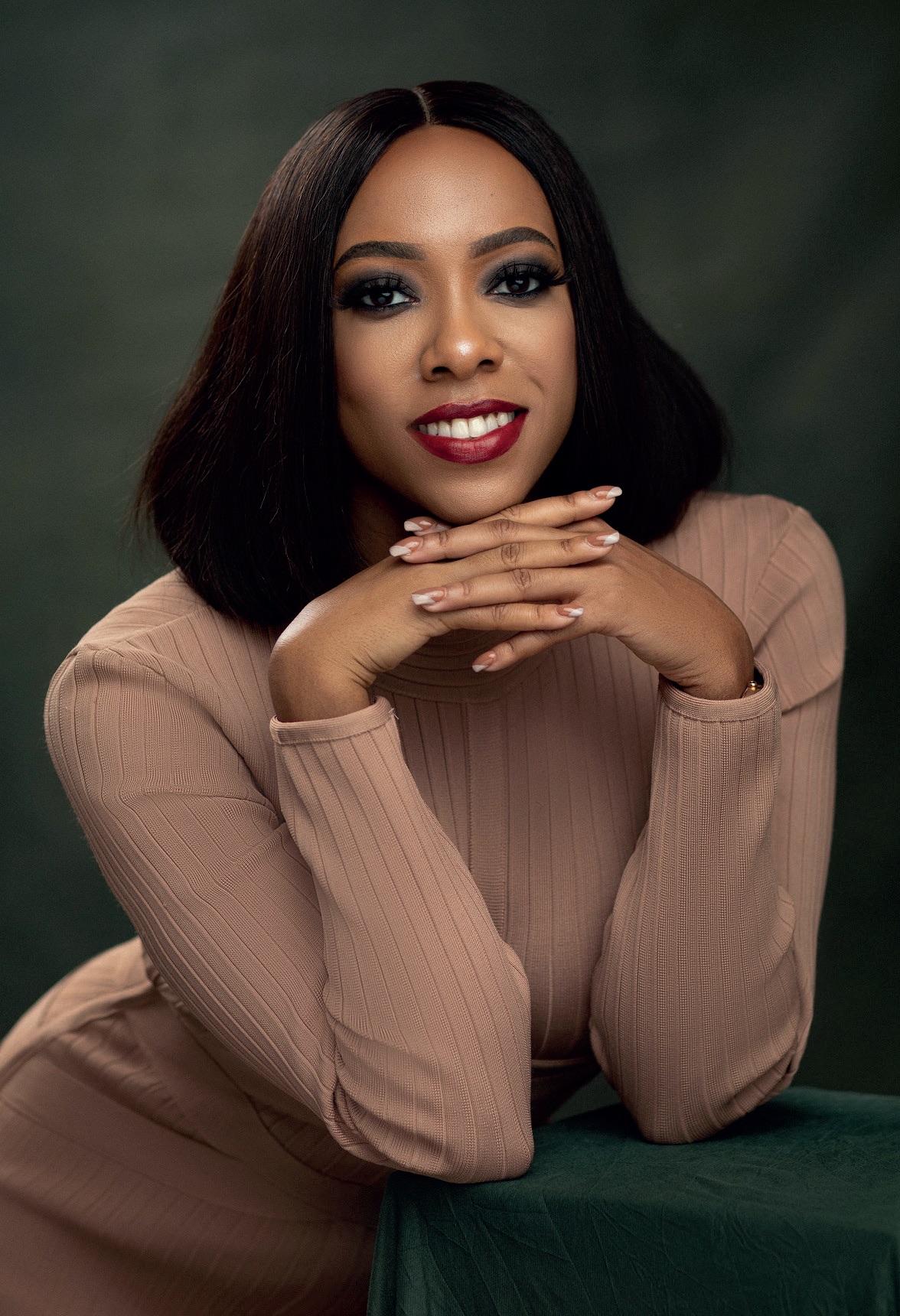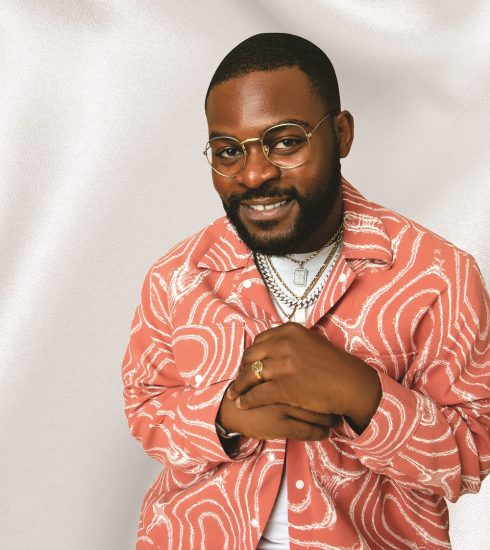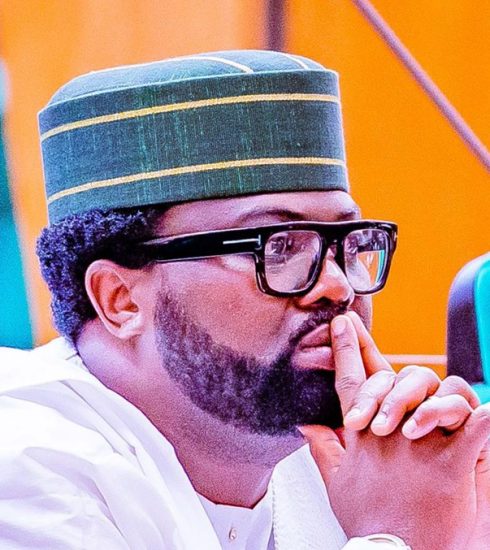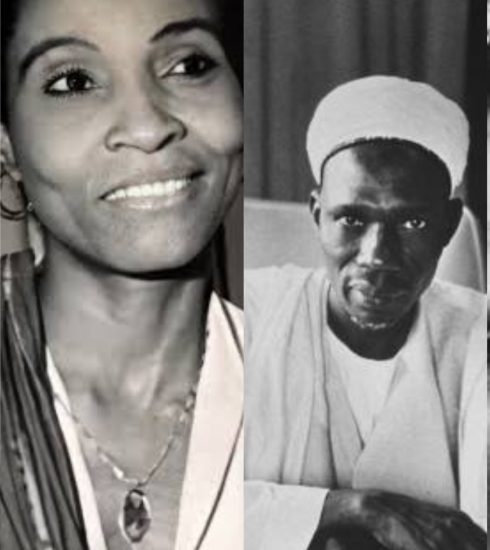FADE OGUNRO: A Feminist in Tech
Bad Energy by Wizkid, the sounds of crab shells cracking and her subtle chuckle, set the tone for when I eventually got techpreneur and board member of the Cherie Blair Foundation, Fade Ogunro on the phone for an interview. Geeky, intelligent, caring and funny are adjectives that barely scratch the surface in terms of qualities bestowed on the founder of Bookings Africa. A profound two-and-ahalf- hour-long dialogue, saw me drinking from the fountain of knowledge that is Ms. Ogunro. The most introverted extrovert you’d ever come across. We discussed building legacies, the struggles of a woman in the tech ecosystem and the world, her plans for the future, and her energy. Tilewa Kazeem, reports for DOWNTOWN in this riveting chat with Fade Ogunro.
What is Bookings Africa?
It’s the future of work. The future of work that I believe and what research has said. The world is going digital so basically, we want to get to a stage where whatever you currently do to earn money, should be achievable from anywhere with your phone. So if you are an accountant you don’t need to have a 9-5 job as an accountant. Bookings Africa offers you flexibility. You can be an accountant and get paid online without having to go to an office. You wouldn’t have to set foot in an office for the rest of your life and still make money as an accountant. The future of work is digital. You need access to the market and that’s the benefit of going digital. It enables you to have the world at your fingertips. Bookings Africa disrupts the geographical restraint with innovation and technology so that whatever skillset you’ve learnt can be offered to people that need those services across the country. We are currently in 3 countries: Nigeria, Kenya, and South Africa. The mission is to get to 10 sub-Saharan countries and currently we only offer 25 different professions on the platform. Ranging from accountants to fitness instructions to dancers. We want to eventually have 80 different professions on the platform. So with Bookings Africa, it’s all up to you. You could cash out from monetizing yourself and never see the four walls of an office or you could do both it’s all up to you.
You studied Journalism and Creative writing and you are now in Tech. Can you walk us through your journey to this point that is a road less traveled by women?
I am impulsive. I make some crazy decisions that shouldn’t work but thanks to HER (because I identify God to be female by the way), they just do. The trajectory started with me wanting to be the fashion editor of Vogue which was my ideal career path when I picked journalism. On the side, I wanted to become a fashion entrepreneur but the cost of running a business in London was too much overhead for a university student. So instead I had an e-commerce store but I didn’t want to build the website and not know how to promote it, so I decided to learn from Google Ads. I took the exam and randomly got a 100% on the exam on Google AdWords. At the time I knew a couple of people working at Google and when they found out about the results they sold Google to me and after I graduated from Uni, after a series of tests and interviews, I joined Google and it was my first foray into tech but I was never a techie. A couple of years in, I began to want more from life as I wasn’t going to work there for the rest of my life. “Is this the best I can do” was a question I kept asking myself and at the time, I was going through personal issues. I was emotionally dejected after my partner, who I was engaged to at the time in the UK, and I split up. So, I said to myself, “You know that? I’ve never lived in Nigeria, why not now?” After that decision, I moved to Nigeria after leaving at the age of 7 to create a bond with my parents and get away from the whole ex-fiance wahala while I still had Google as a safety net in case things went belly-up after a year. That was 2010 and I’m still here. When I got to Nigeria, I started as a freelance writer after failed digital marketing pitches to banks. I wrote for AM Newspaper, Guardian, ThisDay and some now defunct newspapers. Shortly after, I moved to radio. I worked for Radio Continental FM and Beat99.9FM. While I was at Beat FM, I was running my production company Film Factory with my brother and we shot music videos and commercials. After five years with Beat FM, I resigned and started working full-time at my production company. While working with Film Factory the lack of being able to get locally sourced professionals like light men, stylists, and makeup artists in other countries due to barriers like language, time, etc birthed Bookings Africa. It wasn’t a deliberate leap into tech but the lack thereof that led me into tech and was more about legacy more than anything. Being able to transfer my energy to people long after I’ve left the earth is something that means a lot to me. Knowing that my work and energy is being transferred to people, impacting them positively, and providing for their families is what I pray to God for every day.
Considering that tech was a road less traveled by women did that bother you?
I’ll have to talk about mum for a bit because context is important. Have I suffered from it? Yes, I have. But have I let it bother me? No, because mum taught us to look at life through the lens of a cup half full rather than a cup half empty. Mum is half Nigerian and half British. She shuffles back and forth between the two countries so she has experienced both racism and sexism. She never let that impede her and she never let us see it as a problem. So whatever issues other people have I never let it get to me because that’s a “you problem”.
Using the UK as a model, in your estimation how many years would it take Nigeria to catch up in terms of gender parity ever being achieved?
First off, I think the UN estimates gender parity isn’t going to be achieved until at least 2095. So let that sink in. With that said, we can take tangible actions that can be measured; things like equal pay, but a bus driver can hurl the word Ashawo at me because I happen to be wearing a dress. That mindset is what will take longer to change. Not the financial nor legal inclusion but rather the cultural shift. That is the real problem and the faster that mindset shift can happen the faster everything else trickles down. Put it this way, women make up over 50% of the world population, however, 95% of the world’s economy is controlled by men globally. Sleep with that disparity in your mind and let it guide your actions. For that to be balanced out it transcends legal or financial but that cultural mind shift is going to take centuries to change. So it’s easy for the laws to be amended because those are measurable and tangible acts that can lean towards gender balance but for it to have a long-lasting impact the mindset needs a hard reset.
I don’t think it’s any secret that many women in the tech industry have felt their gender has affected the way that they are perceived or treated. Have you ever found yourself in situations like that and how did you handle it?
I’d refer back to the context of my mum not allowing us to dwell on lack so that’s someone else’s problem. I always believe in the value proposition of what I’m trying to achieve and I feel whether you are a man or woman if you are going to be a blocker then you’re not the right person or it’s just not the right time. Yes, there have probably been instances that I should have paid more attention to but honestly, my mindset is so focused on the end goal that I just dismiss it very quickly and move on. However, I understand that option is not for everyone and a lot of young girls have said the tech space is really difficult for them as they feel outnumbered due to the sheer number of men in that space and don’t feel comfortable in that space. It’s well known in our society that sexual harassment is rife and women are not at ease because in any case of sexual harassment society will turn around and point fingers at them.
What do you think is the best part of being a woman in the tech industry?
To be honest, I think it’s being able to leave a tangible mark in the world that can mold people. I think that’s the most important thing. If you watch the Social Experiment on Netflix, it buttresses the point that majority of the apps we use daily were built by men. From the flow to the design so we are only experiencing life through the lens of men… we don’t know how subconsciously these algorithms are affecting our mindset as women. Maybe it’s promoting the man’s mindset because we are seeing, living, and experiencing technology from the perspective of a guy. We don’t have the data to show what some of the differences could be if they were created by women. There’s a popular saying, “No war has been started by women” and if that’s the case why not let women try and see how we’d resolve things. We can see in society how trivial things such as likes, followers, and social media validation has increased the suicide results. GenZ has the highest rate of suicide and it’s directly linked to social media. Perhaps if a woman had developed that, she might have built Instagram differently, maybe taken out the like button. That would have directly impacted the rate of suicides but because of the lack of representation at round tables that affect us all e be things. More women in tech will create inclusivity, improve diversity representation and proffer better solutions.
Can you suggest some methods or actions that motivate young women to pursue careers in IT?
I’ll go to a case study World bank did in Kano late last year in collaboration with Google and Upwork. They were looking to expose tech to women in Northern states. What they had to look at were the nuances in that society and then come up with solutions. Being an Islamic state, they aren’t as liberal as we are in Lagos and some other parts of the country. So what they did was build a female-only accelerator hubs with free training. They then had to go to the leaders of those communities and to get their buy-in they had to get a bus, drive them there, feed them and bring them back. They even took them on a tour around the facility and after getting their support, these women were then able to join. They trained about 50 women on skills like graphics illustrations and other digitally lucrative jobs. Now 20% of these women are making income just simply by being on Upwork. Some months prior they had no inkling as to the what and how of these skills. It’s not just on the part of the parents of girls but then the educators to find more inclusive environments for them.
Put it this way, women make up over 50% of the world population, however, 95% of the world’s economy is controlled by men globally. Sleep with that disparity in your mind and let it guide your actions.”

How does Bookings Africa help expand the gender conversation in Nigeria and what influence does it have on giving more women opportunities in tech?
With the gender conversation, I’d say it helps elevate gender disparity in terms of you being your own boss. Nobody is dictating how much you charge because you put a value on your skills. If you are a girl and you want to charge 2million naira or 1 naira that’s completely up to you. The fact that you can be objective on what you charge or what you earn I think helps balance out the gender disparity when it comes to pay. Furthermore, we don’t necessarily need them be into tech. What we do is, encourage them to utilize tech, enabling them to earn more and in a couple of weeks Bookings Africa will be giving them access to finance. Now a lot of women, especially the freelancers, are young and they don’t have a registered business so they don’t pay taxes which means they can’t get loans. Since there are no records of a steady income, if they go to banks to apply for a loan there is no validity asides from a couple of credit alerts and hearsay. With the way the technology is set up, we allow for automated bookkeeping so you have an automated track record of all the professional services you’ve offered making you more eligible for loans. We are enabling women to be more financially included through the use of tech.
It’s been over a year since Bookings Africa launched. What has the company been able to achieve and how does the company intend on using that as a slingshot to help tackle unemployment in the coming years?
First of all, we’ve expanded to 3 sub- Saharan countries and we are the only digital gig-work platform in Africa with video call services. Over a hundred thousand downloads of our app, over 10,000 approved service providers that are signed up to the platform, Provision of over $500,000 worth of jobs in 2020 alone and we’ve raised just under a million dollars in funding. We have over 36 partners across the 3 countries. We spent the better part of 2020 developing those partnerships and now we plan to take full advantage of them. Some of which are, Lagos Employment Trust Fund, Access Bank, Quickteller and a lot more that we are going to announce over these coming months as each one of them has a strategy to tackle unemployment. One of my biggest strategies which we are announcing this April is my SMARTPOS. Bookings Africa is launching 1000 branded smartphones which is an Android smartphone and a POS all in one. We are giving these phones away for free in conjunction with LACTF. All the recipients of these phones have to do is sit for a one-hour digital literacy training test, once you pass and you are registered on Bookings Africa you get the phone. To keep these phones, you have to spend 30,000 naira a month on the phone for one year. The device will come with apps of the partners, Quickteller, Access Bank and obviously the Bookings Africa App. With the phones, they can be taught how to become an agency banker. Rolling out with the new Access Bank and Quickteller apps updates, Bookings Africa will become an embedded service on the bookings app.
Do you have any other tech startups launching?
Yes but I’m holding that close to my chest for now!
Having worked at Google in the U.K right after Uni and now running a start-up tech company of your own, it’s safe to say you’ve had the best of both worlds. How conducive is the terrain for women across both worlds and what are the common struggles women in tech face there that you also faced when you became a techpreneur here?
The UK has been tackling gender inclusivity long before Nigeria. They focus on nurturing the values and skills you bring to the table to help you perform optimally regardless of your gender. It was a culture shock when I moved over here because the disparity and misogyny between both worlds was so wide.
You recently became a board member of the Cherie Blair Foundation. How does it feel being a part of such a prestigious foundation that has done so much for women over the years?
I’m still trying to process it to be honest. I’m absolutely honored. Just speaking to them, knowing how much their goals are in alignment with mine is practically a blessing. It helps accelerate the plans She (God) has for me and the legacy I’m trying to impact in people’s lives positively.
How do you plan on using Bookings Africa in partnership with the Cherie Blair Foundation to elevate less privileged women and educate them on how they can provide more for themselves?
There’s actually something in the works that is a feature that will be made available through the Cherie Blair Foundation to educate female entrepreneurs. It’s called Herventure and we are looking for ways to partner with Bookings Africa but that’s all I can say about that.
With you as a board member on the Cherie Blair Foundation, What do you have planned for women in Nigeria and Africa as a whole?
I plan that by 2025 latest if you are on my platform, you should be able to double your earning capacity. To have trained over a million women and distributed over two millions SMARTPOS phones. To be a gateway to provide access to finance and the last one is to be able to pay taxes directly to the government in an automated manner on behalf of these freelancers, that way formalizing the informal sector. The 100,000 women campaign is to raise £2million by 2022 and directly impact the lives of over 100,000 women.






